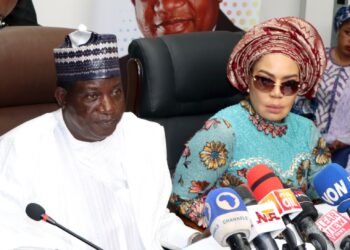N20bn for new prisons, repairs
N1bn on new vehicles, N621m for fuel
It can’t end recession – Expert
By Abdulaziz Abdulaziz
Abuja
There appears some light at the end of the tunnel for prison inmates across the country, as they are expected to be fed with about N17 billion in 2017.
This is according to budget estimates of the Nigeria Prison Service (NPS) as contained in the 2017 Appropriation Bill.
The budgetary vote for feeding, listed under line item; “Food stuff/Catering Supplies” is placed at N16, 665,040, 250.
The amount is expected to feed some 63,000 inmates serving various terms in prisons across the country.
In August, the Ministry of Interior announced that the NPS was holding 63,000 inmates, with about 45,263 of them awaiting trial.
The NPS has total proposed allocation of N72,341,656,336 out of which N37,597,254,496 will be spent on personnel cost. Recurrent expenditure for the service is put at N57, 432,453,013, while overhead cost has provision of N19, 821,848,517.
A further insight into the appropriation bill, shows that construction and repairs of new prisons and barracks featured under different line items in the NPS budget, all of which amounted to over N20 billion.
The Service earmarked N7, 073,766,518 under the line item “Construction/Provision of Prisons”.
Another sum of N4, 366,254,120 is set aside under the budget line of “Rehabilitation of Prisons/Barracks Nationwide” with project code, Prisons73472816.
Curiously, the same budget line title is used with a different project code of “Prisons77457745” to make provision for another N1,229,019,555.
The sum of N6, 801,641,958 is set aside for the provision of a 3,000-capacity model prison in Kano, just as N172, 641,968 is proposed for construction of satellite prisons and barracks in 14 locations.
However, only six of the 14 locations are mentioned. They are Nafada, Bagoro, Bubacha, Tambuwal, Gwaram and Dawakin Kudu.
Drugs and medical supplies for the Prisons Service is expected to cost N432 million, just as the service projected to spend N357 million on “uniform and other clothing”.
The Prisons Service is also expected to spend over N1 billion on purchase of operational vehicles, as well as some N621 million to fuel its vehicles and generating plants. Fuelling of motor vehicles will gulp N587, 202,000 of the total, while plant/generator fuel is expected to cost N34, 371,437.
The sum of N321, 633,480 is provided under the project name, “Prisons Biometrics” without specifying whether the exercise is for personnel of the service or inmates.
Still within the 2017 fiscal year, the Prison Service is expected to spend N109, 510,861 on travel and transport, as well as N133, 150,340 on local training. There is no provision for overseas training in the NPS budget.
In a related development, an economist has questioned President Muhammadu Buhari’s optimism that the 2017 federal ‘Budget of Recovery & Growth’ would bring an end to the current economic recession in the country.
An Abuja-based development economist, who is also the Chief Executive of Pan-Africa Development Corporation, Odilim Enwegbara, said the budget presented last week to the National Assembly for consideration and approval, would hardly achieve that goal.
“If Mr. President hopes to grow the economy out of recession in 2017, this budget is not the one to do it. This is because it is not an expansionary budget, but also that it is not pro-investment, pro-growth, and pro-jobs. It is not enough to expect it to perform such a magic”, Enwegbara said.
While agreeing that the recession was not a “sudden accident”, he said what it needs urgently is serious restructuring and overhauling.
This, he added, should come with unconventional policies designed to permanently put the economy on a path of sustainable growth.
He noted that the restructuring of the economy had not yet happened, because gifted pro-expansionary Nigerians were yet to be brought together by the government to perform the “inevitable economic diversification surgery.”
Nigeria’s budget to gross domestic product ratio, according to him, had remained very low, because the country’s tax to GDP ratio was the lowest among its peer economies, like South Africa, over the years.
While South Africa’s tax to GDP ratio was as high as 26.3 per cent, the economist said that of Nigeria was still close to what it used to be in the mid-2000s commodity booms.
(Premium Times)



